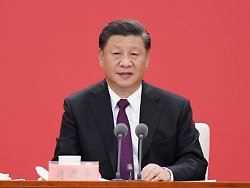With the trade war with the US in mind, China is reorganizing its economic policy. In the future, the People's Republic wants to be more independent from the world market. The change of course could mean an opportunity for German companies.
China wants to make itself less dependent on the rest of the world. In view of the trade and technology war with the USA and the global economic downturn caused by the corona pandemic, the new five-year plan is intended to make the country more independent. The most significant realignment of the second largest economy in a long time brought the leadership of the Communist Party on the way to the conclusion of four-day deliberations in Beijing.
At the plenary session of the Central Committee, state and party leader Xi Jinping had previously explained the recommendations, as reported by state media. He pursues the strategy of "dual cycles", which continues to emphasize the opening of China, but emphasize the promotion of the domestic market as the main engine and one's own innovation for greater independence. Experts spoke of a "major change in China's economic policy," which was declared as a response to US pressure and anti-globalization trends.
Focus on promoting domestic demand
The plan could open up new opportunities for German companies, for whom China was the main trading partner in 2019. "Investments or research cooperation in strategically important areas are more important than ever for China in view of the geopolitical environment," said Max Zenglein from the China Merics Institute in Berlin. "For German companies that want to participate, China is rolling out the red carpet." The focus of the project is the promotion of domestic demand as well as research and development for "internal circulation" as the "mainstay of the economy". The "external cycle" – i.e. international trade and investment from abroad – is assigned a supporting role.
The 14th five-year plan for the period from 2021 to 2025 is due to be approved in March at the annual meeting of the People's Congress. "China is now realizing it is vulnerable," said Wang Huiyao, advisor to the Chinese government and founder of the Center for China and Globalization, told Bloomberg finance agency. He referred to the American sanctions against Chinese technology giants such as the largest network equipment manufacturer and second largest smartphone manufacturer Huawei. "So leaders need to be prepared for something like technological decoupling."
China's economy on a growth path
According to the merics expert Zenglein, China does not want to detach itself from the global economy. "Striving for more independence is not to be equated with a process of decoupling," he said. "In the expectation that the headwinds from abroad will increase, China's leadership is betting on absorbing global value chains." Beijing is "well aware" of the importance of foreign companies in China for economic development.
With the coronavirus under control, China is likely to be the only major economy to grow this year. After a sharp slump at the beginning of the year, the country's economy grew again by 4.9 percent in the third quarter compared to the same period last year. This means that growth of 0.7 percent has been achieved since the beginning of the year. The new five-year plan should also draw lessons from the – at least initially inadequate – handling of the corona outbreak and strengthen the health system. The pandemic revealed an incomplete reporting and monitoring system for infectious diseases, inadequate training of medical workers and an unbalanced distribution of resources between urban and rural areas, epidemiologist Zeng Gang of the Chinese health department (CDC) told the Global Times.
In addition, China's goals in the fight against climate change are to be laid down. President Xi Jinping announced in September that China wanted to achieve climate neutrality "before 2060". Its carbon dioxide emissions should also peak "before 2030" – not "around 2030", as China had promised in the Paris climate agreement. Climate neutrality means that the use of fuels or human activities have no influence on the carbon dioxide concentration in the atmosphere and are therefore not harmful to the climate.
. (tagsToTranslate) economy (t) China (t) trade disputes (t) trade relations (t) Xi Jinping
